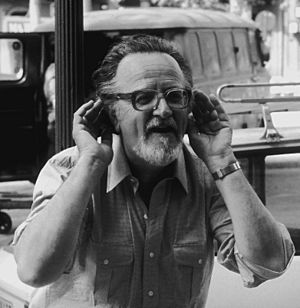José Donoso facts for kids
Quick facts for kids
José Donoso
|
|
|---|---|

Donoso in 1981
|
|
| Born | José Manuel Donoso Yáñez 5 October 1924 Santiago Chile |
| Died | 7 December 1996 (aged 72) Santiago Chile |
| Occupation | Writer, journalist, professor |
| Language | Spanish |
| Nationality | Chilean |
| Alma mater | Princeton University |
| Genre | Novel, short story |
| Literary movement | Latin American Boom |
| Years active | 20th century |
| Notable works | Hell Has No Limits, Coronation |
| Notable awards | National Prize for Literature (Chile) 1990 |
| Spouse | María del Pilar Serrano |
| Children | Pilar Donoso |
José Manuel Donoso Yáñez (born October 5, 1924 – died December 7, 1996), known as José Donoso, was a famous writer, journalist, and teacher from Chile. He lived most of his life in Chile. However, he also spent many years living outside his home country in places like Mexico, the United States, and Spain.
Donoso wrote many short stories and novels. His books were a big part of the Latin American Boom, a time when many great Latin American writers became well-known. Some of his most famous books are Coronación (Coronation) and El lugar sin límites (Hell Has No Limits). His stories often explored ideas about how people can seem different on the inside and outside. He also wrote about how people think and feel, often with a touch of dark humor.
Contents
Early Life and Education
José Donoso was born in Santiago, Chile. His father was a doctor named José Donoso Donoso. His mother was Alicia Yáñez.
He went to The Grange School and José Victorino Lastarria High School. Even though his family was comfortable, he worked as a juggler and an office worker when he was young. This was before he became a writer and teacher.
In 1945, he traveled to the southern parts of Chile and Argentina. There, he worked on sheep farms. Two years later, he finished high school. He then began studying English at the Universidad de Chile (University of Chile).
In 1949, he received a special scholarship. This allowed him to study English literature at Princeton University in the United States. While at Princeton, he wrote his first two stories in English. They were called "The Blue Woman" (1950) and "The Poisoned Pastries" (1951). He graduated from Princeton in 1951.
His Writing Career
After college, Donoso traveled to Mexico and Central America in 1951. He returned to Chile in 1954. He started teaching English at the Catholic University and the Kent School.
His first book, Veraneo y otros cuentos (Summer Vacation and Other Stories), came out in 1955. It won the Municipal Prize of Santiago the next year. In 1957, he published his first novel, Coronación (Coronation). In this book, he wrote about the old-fashioned ways of the upper classes in Santiago. This book was later translated into English.
In 1958, he moved to Buenos Aires, Argentina, but came back to Chile in 1960.
He began writing for the magazine Revista Ercilla in 1959. He sent reports from Europe while traveling there. He continued to be an editor and literary critic for that magazine until 1964. He also helped edit a Mexican journal called Siempre.
In 1961, he married María del Pilar Serrano. She was a painter, writer, and translator. They had met in Buenos Aires.
In 1965, they left Chile again. They lived in Mexico and then Spain. From 1965 to 1967, Donoso was a writer who taught and worked at the University of Iowa. In 1968, he and his wife adopted a baby girl from Madrid. They named her Pilar Donoso.
After returning to Chile in 1981, Donoso led a writing workshop. Many future writers attended his classes.
He kept publishing novels throughout his life. Some of his later works include La desesperanza (Curfew), Taratuta, and Naturaleza muerta con cachimba (Still Life with Pipe). Two of his books, El mocho (1997) and Lagartija sin cola (The Lizard's Tale), were published after he died.
Later Life and Death
José Donoso passed away from a type of cancer in his home in Santiago on December 7, 1996. He was 72 years old. People say that on his deathbed, he asked for poems from Altazor by Vicente Huidobro to be read to him. He was buried in a cemetery near a spa, about 80 kilometers from Valparaíso.
In 2009, his daughter, Pilar Donoso, wrote a book about her father. It was called Correr el tupido velo (Drawing the Veil). The book was based on his personal writings and Pilar's own memories.
Awards and Honors
- 1956: Premio Municipal de Santiago
- 1962: William Faulkner Foundation Prize for Latin American Literature
- 1969: Premio Pedro de Oña (Spain)
- 1978: Premio de la Crítica de narrativa castellana (Spain)
- 1990: Premio Mondello (Italy)
- 1990: Premio Nacional de Literatura en Chile
- 1991: Prix Roger Caillois (France)
- 1995: Caballero Gran Cruz de la Orden del Mérito Civil (Spain)
See also
 In Spanish: José Donoso para niños
In Spanish: José Donoso para niños
 | Valerie Thomas |
 | Frederick McKinley Jones |
 | George Edward Alcorn Jr. |
 | Thomas Mensah |

